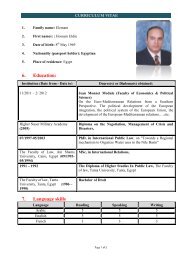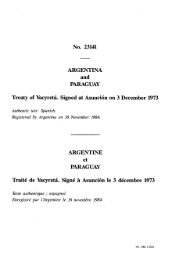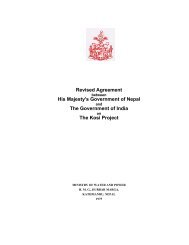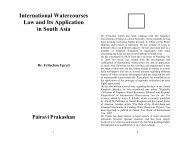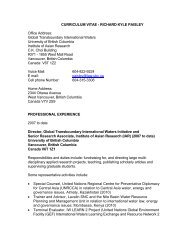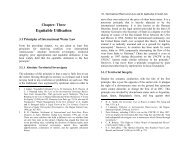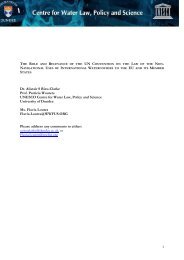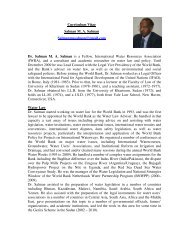Upreti, Trilochan, International Watercourses Law and Its Application ...
Upreti, Trilochan, International Watercourses Law and Its Application ...
Upreti, Trilochan, International Watercourses Law and Its Application ...
You also want an ePaper? Increase the reach of your titles
YUMPU automatically turns print PDFs into web optimized ePapers that Google loves.
248 / <strong>International</strong> <strong>Watercourses</strong> <strong>Law</strong> <strong>and</strong> <strong>Its</strong> <strong>Application</strong> in South Asia Prospects <strong>and</strong> Problems of Nepalese Water Resources / 249clear that not all harm is prohibited by law, <strong>and</strong> the abovementioned notification is not a legal requirement in every case.The existing WB policy departs from that of the UNCIW, <strong>and</strong>as a result favours bigger <strong>and</strong> more powerful lower riparian tothe detriment of smaller <strong>and</strong> weaker upper riparian states. TheWB does not have the authority to change or undermine thebalance reached in the UNCIW by introducing its owncontroversial conditions on financing projects on internationalwaters <strong>and</strong> the WB also does not have the authority to definerights, duties <strong>and</strong> obligations of upper <strong>and</strong> lower ripariancountries in IWC’s. 197Special clauses favourable to the less developed states havebeen written into the instruments of numerous institutions, suchas GATT, the WTO, the UNCTAD, <strong>and</strong> the LOSC Convention.Moreover, the third United Nations Conference on the LeastDeveloped Countries held in Brussels, 14-20 May, 2001,adopted a programme of action for the assistance of leastdeveloped countries. 198 Such favourable rules are absolutelyessential to a vulnerable state. 199197 Supra note 191, pp. 40-43.198 Special facilities <strong>and</strong> concessions in the international system such astrade, investment <strong>and</strong> favour have been recommended. See “ThirdUnited Nations Conference on the Least Developed Countries”Brussels, 14-20 May, 2001, pp. 4-62.199 J. R. Crook & S. C. McCaffrey, “The United Nations Starts Work on aWatercourse Convention” (1997) in 91 AJIL, pp. 374-377: Article 125 ofthe <strong>Law</strong> of the Sea provides the right of access to <strong>and</strong> from the sea, whichis also regarded as a customary rule of international law <strong>and</strong> gives specialconsideration to l<strong>and</strong>-locked <strong>and</strong> geographically h<strong>and</strong>icapped nations;similar arrangements could be made for such nations whilst applying <strong>and</strong>interpreting the provisions of Article 5 of the UNCIW. Also see supra note74, pp. 187-196. The WTO <strong>and</strong> Debt relief movement of the BrettonWoods Institutions, <strong>and</strong> the Millennium Development Goal set by the UNfor development for poor countries <strong>and</strong> the UNCTAD also undertookspecial clauses favouring the support of such nations in their manydocuments, <strong>and</strong> all these matters are guided by the concept of equity. Thus,the international community needs to adopt a new plan <strong>and</strong> policy in orderto underst<strong>and</strong> <strong>and</strong> address the pressing needs of weak, vulnerable <strong>and</strong>geographically disadvantaged nations.Nepal has continually come off badly in bilateral arrangementwith India. After the conclusion of several feasibility studies<strong>and</strong> the expenditure of vast amounts of time <strong>and</strong> money, theSikta, Babai <strong>and</strong> Rapti irrigation projects, the MulghatMultipurpose project <strong>and</strong> the Kanaki Multipurpose project wereall cancelled due to Indian objections. 200 Recently, the WB haslent US$ 80 million for a power development fund to Nepal;this was in fact announced after the cancellation of the Arun IIProject (1995). It has asked riparian consent from China, India<strong>and</strong> Bangladesh, a move that has been severely criticised inNepal by water experts, saying that it will establish a newunjust precedent, <strong>and</strong> a discriminatory attitude towards Nepal;for these reasons some of them have recommended that Nepal’srelationship with the Bank should to be reviewed. 201 Moreover,S. N. Paudel went on to say that the Bank did not giveinformation to or obtain consent from Nepal while it provided aUS$ 1 billion loan to the Indian state of Uttar Pradesh todevelop an irrigation project. 202 At the same time it is askingriparian consent before lending money to the PowerDevelopment Fund (PDF) in Nepal, which is obviously a caseof discriminatory behaviour on the part of the Bank.The Global Environment Facility (GEF) was established <strong>and</strong>subsequently restructured to carry out sustainable developmentactivities in the areas of global warming (50% of its fund), Bio-Diversity (30%) <strong>and</strong> to protecting <strong>International</strong> Waterways(20%). However, there are similar preconditions as well.Besides, every nation <strong>and</strong> institution has adopted similarrules. 203 Thus, it is argued that the consideration of the unfair<strong>and</strong> impractical circumstances prevailing upon vulnerable200 Supra note 22, p. 341.201 Staff, “the World Bank lent money against its own policy”, A highlyplaced authority in the Ministry of Water Resources also noted thatsuch loan was provided without giving notice to Nepal. TheKathm<strong>and</strong>u Post, August 7 & October 3, 2002.202 Staff, “Nepali Experts comes heavy to the World Bank”, The RisingNepal 7 August, 2002.203 www.gefweb.org/operational_policies/operational_programs/OP_8_english.pdf.



